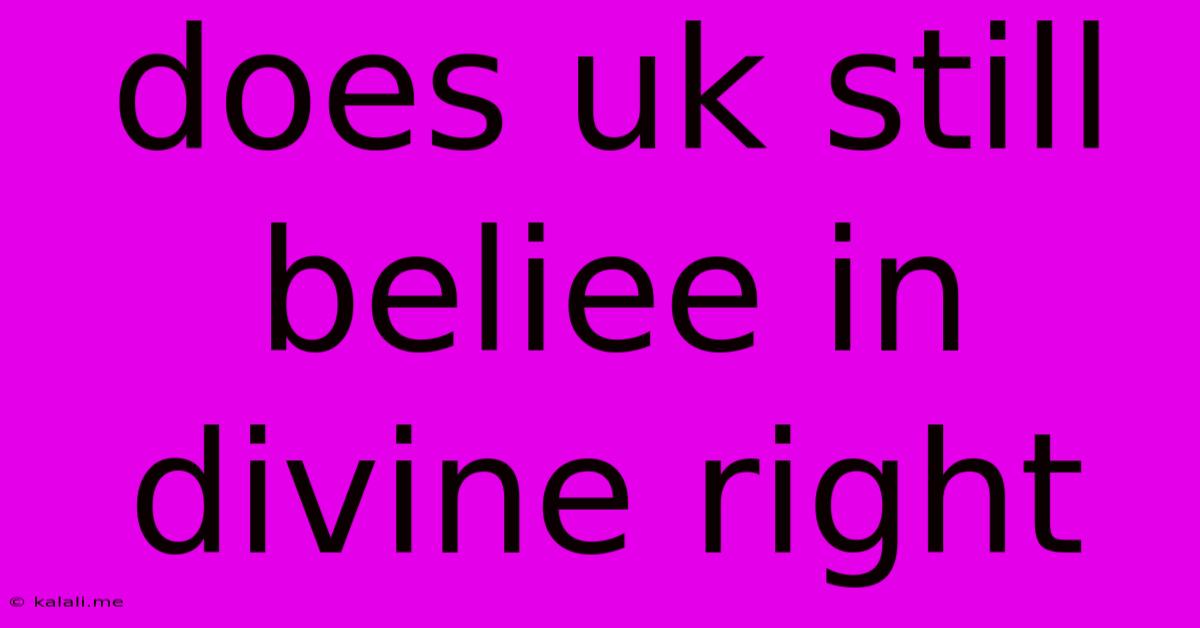Does Uk Still Beliee In Divine Right
Kalali
Jun 11, 2025 · 3 min read

Table of Contents
Does the UK Still Believe in the Divine Right of Kings? A Look at Modern Monarchy
The question of whether the UK still believes in the divine right of kings is a fascinating exploration of the evolution of British monarchy and its relationship with its people. The short answer is a resounding no. The concept of divine right, the belief that a monarch's authority derives directly from God and is not subject to earthly powers, is largely a relic of the past. However, understanding its historical significance helps contextualize the modern British monarchy's role and continued relevance.
The divine right of kings was a powerful ideology that dominated European politics for centuries. In England, it reached its zenith under the Stuart monarchs, particularly James I and Charles I. This belief justified absolute rule and fueled conflicts like the English Civil War. The execution of Charles I in 1649 marked a significant turning point, demonstrating the limitations of even a divinely appointed ruler.
The Glorious Revolution and the Shift in Power
The Glorious Revolution of 1688 cemented a significant shift in power dynamics. The deposition of James II and the ascension of William and Mary established the principle of parliamentary sovereignty. This meant that the monarch's power was now limited by Parliament, and the idea of a divinely ordained, absolute ruler was effectively challenged. The Bill of Rights 1689 further solidified this principle, limiting royal prerogatives and establishing Parliament's supreme authority.
The Evolution of Constitutional Monarchy
Since the Glorious Revolution, the British monarchy has evolved into a constitutional monarchy. The monarch's powers are largely ceremonial, with real political power residing in Parliament and the elected government. While the monarch retains certain symbolic roles and functions – such as the Head of State, Head of the Commonwealth, and Supreme Governor of the Church of England – these roles are largely defined and limited by law and convention.
Modern Perceptions of the Monarchy
Today, the British public's view of the monarchy is complex. While the divine right theory is utterly rejected, the monarchy enjoys significant popular support, largely due to its symbolic role as a unifying national institution and the personal qualities of its members. The institution represents continuity, tradition, and a sense of national identity. However, this support isn't based on any belief in inherent divine authority but rather on its perceived value to the nation's cultural identity and soft power. Public opinion fluctuates, influenced by various factors like royal scandals and changes in the political landscape. Debates surrounding the monarchy's future, its role in a modern society, and its financial implications are ongoing.
The Symbolism Remains, but the Divine Right is Gone
The continued existence of the monarchy doesn't imply a belief in the divine right of kings. The symbols and traditions associated with the monarchy, such as coronations and state ceremonies, retain significance, representing a continuity of history and national identity. However, these are understood within the context of a constitutional monarchy, where the monarch's power is subject to the rule of law and the will of the people as expressed through their elected representatives. The modern British monarchy operates within a framework defined by centuries of political evolution, far removed from the absolutist claims of divine right. The notion that the monarch's authority comes directly from God is, in the modern era, a historical curiosity rather than a political reality.
Latest Posts
Latest Posts
-
Who Is Commonly Considered The Father Of Behaviorism
Jun 12, 2025
-
The Sum 3 Of Consecutive Even Numbers Is 125
Jun 12, 2025
-
Parts Of Digital Single Lens Reflex Camera
Jun 12, 2025
-
How Many Players On A Basketball Team On The Court
Jun 12, 2025
-
How Do You Find The Perimeter Of A Cube
Jun 12, 2025
Related Post
Thank you for visiting our website which covers about Does Uk Still Beliee In Divine Right . We hope the information provided has been useful to you. Feel free to contact us if you have any questions or need further assistance. See you next time and don't miss to bookmark.